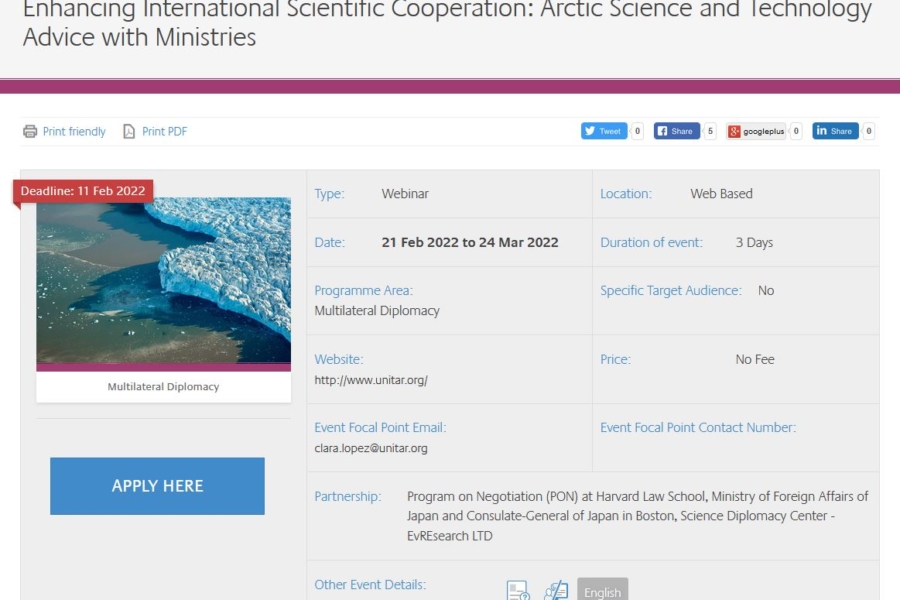Apply for a webinar series "Enhancing International Scientific Cooperation: Arctic Science and Technology Advice with Ministries" (Deadline: 11 February)

The training on Enhancing International Scientific Cooperation: Arctic Science and Technology Advice with Ministries is composed of a series of 3 webinars, namely:
First Webinar: 21 February, 2022, at 13:00 GMT (04:00 AK / 07:00 CST / 08:00 EST / 14:00 CET/ 15:00 EET / 16:00 Moscow / 22:00 Japan)
1. What is Arctic Science?
- How do natural sciences, social sciences and indigenous knowledge ‘fit together’ and enhance each other?
- How is science facilitated/conducted? Who is needed to do ‘the science’?
- Is international cooperation needed? If so, to what degree?
with keynotes from
- Prof. Andrey Petrov – Associate Professor, University of Northern Iowa, US; Former President, International Arctic Social Sciences Association (IASSA).
- Mr. Henry Burgess – Head, UK Arctic Office, Vice-President, International Arctic Science Committee (IASC).
- Dr. Kirsi Latola – Vice-President Networks, University of the Arctic, Finland; Chair, European Polar Board.
Second Webinar: 10 March, 2022, at 13:00 GMT (04:00 AK / 07:00 CST / 08:00 EST / 14:00 CET/ 15:00 EET / 16:00 Moscow / 22:00 Japan)
2. How can science transform data into evidence for informed decisionmaking?
- How are the decisions on what priorities are to be addressed made?
- Who are the decision makers?
- What evidence is needed and how is that evidence defined?
with keynotes from
- Prof. Anne Husebekk – Professor and Former Rector, UiT | The Arctic University of Norway; Vice-President for Freedom and Responsibility in Science, International Science Council;
- Prof. Larry Hinzman – Executive Director, Interagency Arctic Research Policy Committee (IARPC); Assistant Director for Polar Sciences, Office of Science and Technology Policy (OSTP), Executive Office of the President, The White House; President, IASC.
- Dr. Volker Rachold – Head of the German Arctic Office, Germany; Co-Host ASM2.
Third Webinar: 24 March, 2022, at 13:00 GMT (04:00 AK / 07:00 CST / 08:00 EST / 14:00 CET/ 15:00 EET / 16:00 Moscow / 22:00 Japan)
3. What international efforts/processes are needed to facilitate progress in understanding the Arctic system and its global impacts?
- What are the mechanisms that exist?
- Are these mechanisms adequate?
- How could enhanced science cooperation impact other areas of international relations?
with keynotes from
- Dr. Andrey Bryksenkov – Deputy Director, Russian State Hydrometeorological University; Co-Host ASM4.
- Dr. Anne Puech – Deputy Director of Department on Ecology, Agronomy, Environment, Earth and Universe Sciences Sector, Ministry of Higher Education, Research and Innovation; Co-Host ASM4.
- Amb. Anton Vasiliev – Russia’s Senior Arctic Official 2008-2014; Ambassador to the Republic of Iceland 2014-2020.
- Ms. Fran Ulmer – Former Lt. Governor, Alaska; Former Chair, US Arctic Research Commission; Senior Fellow, Arctic Initiative, Belfer Center, Harvard Kennedy School.
- Dr. Hiroyuki Enomoto – Vice Director-General, National Institute for Polar Research, Japan; Co-chair ASM3 Science Advisory Board, Japan; Vice-President, International Arctic Science Committee (IASC).
The 3 webinars with this project are open to Arctic scientists, decisionmakers, experts and residents as well as other interested individuals, inclusively. Registration is required.
Separate from the invited plenary presenters and breakout – session moderators, if registration exceeds capacity, priority will be given to individuals who register for all three webinars.